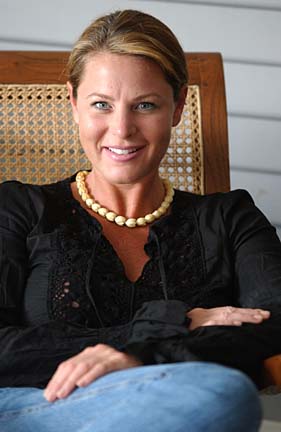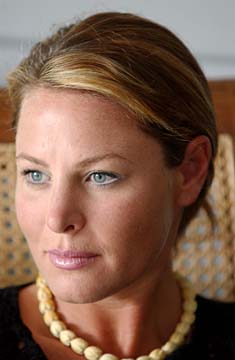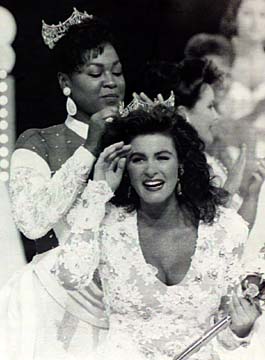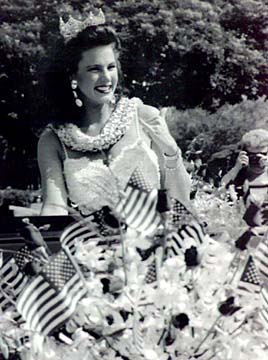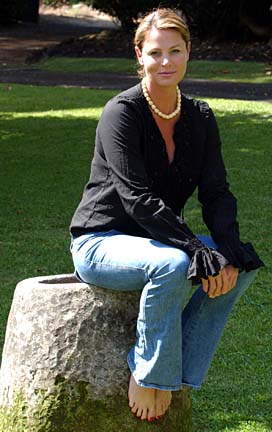

|
First Sunday Mark Coleman |
RONEN ZILBERMAN / RZILBERMAN@STARBULLETIN.COM
Former Miss America Carolyn Sapp relaxes at a friend's home in Honolulu.
More than skin deep
"There she is, Miss America." And there she was, Carolyn Sapp, waiting for me at Ala Moana Beach Park.
"There she is, your ideal." Well, maybe, but this was strictly professional: I wanted to talk with the first woman from Hawaii to become Miss America.
"The dreams of a million girls who are more than pretty can come true in Atlantic City." Sapp won the national crown in 1992. She had been Miss Hawaii and, before that, Miss Hawaii Pacific University.
"For she may turn out to be the queen of femininity." And that she did, at age 24.
"With so many beauties, she took the town by storm, with her all-American face and form." Since winning the crown, Sapp has traveled widely, hobnobbed with celebrities, and worked as an actor, singer, product spokeswoman, motivational speaker and sports-caster. She also has written guest columns for leading newspapers, usually opposing domestic violence, whose victims she helps through her foundation, Safe Places for Women and Children and the Give Back a Smile program.
"And there she is, walking on air, she is." Lately Sapp has been focusing her star-powered spotlight on the alleged sexist treatment of female employees of Wal-Mart Stores Inc. A former chairman of the University of Hawaii political science department said, "That is the gutsiest thing I've ever heard any former Miss America do."
"Fairest of the fair, she is." Sapp grew up both in Washington state, where her mother lives, and on the Big Island, where her father lives. Her home base these days, she said, is "Washington state, here and the Los Angeles area -- LAX airport."
When we met at the park, she was enjoying the day with family on her stepmother's side, who live in Kalihi.
"There she is, Miss America."
RONEN ZILBERMAN / RZILBERMAN@STARBULLETIN.COM
"Women's issues! I'm telling you, I'm an activist, and people know I'm not afraid to speak out on issues that are a little tougher for some people." --Carolyn Sapp, Miss America 1992
Hawaii's first Miss America
Mark Coleman: You realize that you're in the record books now as one of those "Hawaii firsts."Carolyn Sapp: Yep: The first Miss Hawaii ever to win Miss America. It was an incredible honor. I was really proud. But it was also really humbling. It's still humbling. I walk down the street and somebody will go, "Eh! Eh! I know you!" It's sweet. It's precious to me. I feel very privileged and honored that I was able to represent Hawaii.
MC: It seems that once you became Miss America, everyone wanted to have a piece of you -- not necessarily in a bad way. Like the Lutherans: You're on their list as being one of the famous Lutherans in the world.
CS: Isn't that nice? There are so many people in the world that aren't wanted.
MC: That's a good way to look at it.
CS: You know? How lucky am I?
Pondering politics
MC: When you became Miss Hawaii and then Miss America, you were saying at the time that when you got out of college, you wanted to maybe have a career in state government somehow. What happened to those plans?CS: I don't think I'm that far away from that still. I'm young, and there are opportunities that I've been given that have been very good for me to grow and learn about myself. There's a stretching period, and I need to follow paths as I go along. But I would still like to come back to Hawaii and involve myself politically. I am a little jealous -- I was thinking maybe I could be the first woman governor of Hawaii, but, you know, it didn't happen.
MC: (Laughs) Well, you could become the first Miss Hawaii to become governor of Hawaii. How about that?
CS: I don't think that is an unreasonable or undoable thing.
FILE PHOTO
Carolyn Suzanne Sapp, Miss America 1992, is crowned on Sept. 14, 1991, by outgoing Miss America Marjorie Judith Vincent.
Fighting domestic violence
MC: After you became Miss America, one of the first things you did was that (television) movie ("Miss America: Behind the Crown") about an abusive relationship you had been in. How did that come about? Was that because you had made domestic abuse an issue during your Miss America campaign?CS: Oh, not at all. Actually it was something that was very private and very personal and I never wanted it to come out. It came out the night I won Miss America. A reporter from Hawaii is the one who did it.
MC: Why, he dug up some records or something?
CS: Basically, I had had my former boyfriend arrested for assault. It was something that was very hurtful and bad, but I had moved on. We had not been together for a while. It was over. My focus when I was Miss Hawaii, and then when I was Miss America, was "education is everyone's business."
MC: Well, if the information came out against your wishes, why did you agree to star in that film?
CS: It was done during the year that I was Miss America, and when you're under contract for Miss America, they own you for that year, and you do whatever they want you to do.
MC: And they wanted you to do that film?
CS: I really didn't have a choice, Mark. At that time, it was so volatile and crazy, and the media were really scary for me. I mean, I really am a simple ranch girl and I really do stay with my grandmother in Kalihi when I'm on Oahu. So it was really scary for me because, at that time, the Miss America organization said that NBC, ABC, CBS -- everybody -- was going to be doing all these stories of my life. My life. People who didn't even know me! They came to me and said the only way I could have any control would be for me to cooperate. So I went back to my former boyfriend and I said, "OK, they're going to do this, whether we say yes or no. But we might be able to have some control of where the focus is of the movie if we come together and agree to do this." So we both agreed to do the movie. And me playing the part of myself in the movie just kind of came after the fact.
MC: After that, you got involved with some group that provides shelter for women or something like that.
CS: I founded Safe Places for Abused Women and Children. It's still going strong.
MC: Then you went on to a nicer thing called Give Back a Smile.
CS: Well, it's not nicer in the fact that it helps women who have been abused, and maybe they got a tooth knocked out.
MC: I thought it was about providing smiles for underprivileged children or something.
CS: No, it actually provides smiles for women who have been in horrible, abusive relationships and maybe have had damage to their mouths from fists, or have lost teeth or maybe got infections because they didn't have adequate health insurance. Give Back a Smile (set up by the American Academy of Cosmetic Dentistry) is an amazing program and they've helped hundreds (of abused women).
Lessons for abused women
MC: As far as domestic violence goes, what do you think about the value of TROs (temporary restraining orders) versus, let's say, women learning how to defend themselves?CS: Well, you have to understand that when I was dealing with it, there were no protocols. We're talking over 10 years ago.
MC: What do you tell people now, if a woman is in an abusive relationship?
CS: Get out. Get safe. Don't stay. Period. But you have to understand that I've been working on this for over a decade, and the average woman stays five to seven times (incidents of abuse) before she'll get out. It's very sad and frustrating.
FILE PHOTO
Sapp rides in a motorcade in Waikiki a month after being crowned Miss America.
Women vs. Wal-Mart
MC: I guess you've seen the new Wal-Mart going up over on Keeaumoku Street. (Smiles)CS: Yeah. (Laughs) You've heard about what I'm doing?
MC: Of course. How did you get involved with that (the effort to sue Wal-Mart for alleged sex discrimination)?
CS: Women's issues! I'm telling you, I'm an activist, and people know I'm not afraid to speak out on issues that are a little tougher for some people.
MC: Have you tried to negotiate directly with Wal-Mart executives about the things you've been going public with?
CS: There's no negotiating with the largest and wealthiest corporation in the world, and it saddens me because here they are, so wealthy, and they can't even pay normal wages so that their employees can afford average, normal health care. In Hawaii, at least, we have a set health-care program, but we're unique in that. I think there's one other state that has it.
I got involved with Wal-Mart in Washington with my mom. They had done an improper zoning where they were draining into the local river. The town fought it and it went all the way through the judicial system. The town won.
MC: So your mom is like a citizen activist?
CS: Absolutely. And I find it amazing that my dad could apply for an add-on to his house and it would take six to nine months to get, but these guys here, in the busiest part of town, got it in, what, three days?
I met the Citizens Against Reckless Development people. I found it really amazing that the loading docks (for the new Wal-Mart) are, like, 40 feet from houses, and they found Hawaiian bones (at the construction site). I mean, people have to understand that their tax money is going to be paying for the health benefits and the below-poverty wages that Wal-Mart offers.
MC: So you're not talking about just the women employees?
CS: It's so far reaching. But the women, yeah. Dukes v. Wal-Mart Stores Inc. is a wonderful lawsuit that needs to happen to make Wal-Mart responsible. It's getting ready to be certified and it will be the largest class-action lawsuit in American history. It could encompass 1.2 million women who have worked for Wal-Mart, from 1998 to 2003.
MC: What will happen if it succeeds?
CS: 1.2 million women will reap the benefits.
MC: What's good about Wal-Mart? There must be a reason for its success.
CS: I think free enterprise is a great tool, but if you or I want to open up a business, we have to follow certain procedures. I don't think it's right that someone who is as wealthy as Wal-Mart can say, "Hey, we're going to bring in all this revenue into your state, so give us a little ease way," because you're not looking at the benefits.
Are they upping the socioeconomic development of this area, of the people they're going to employ? Absolutely not. And who gets rich? Not the local people that are going to work there. And what's sad is all the little community businesses that have been there for 40 or 50 years -- the jewelry shops, the tire shops, the automotive shops -- they're all going to go out of business.
MC: I'm not defending Wal-Mart's business practices really, but it seems to me that the idea that mom-and-pop businesses dominating a local economy is good is not necessarily reasonable. They have higher prices, they have less efficient service frequently.
CS: Absolutely. Competition is good, but at what cost?
MC: That's perhaps a separate issue, if what you're upset about is Wal-Mart getting preferential treatment under the law.
CS: Well, the lawsuit is very specific in that it's based on only two things: wages and promotions. It's that Wal-Mart does not pay a woman the same as it pays a man, nor do they promote them the same as a man -- and that's with the same evaluations and the same grades. For me, I have to say, the most empowering thing is that I've been given the opportunity to meet these women (who are suing Wal-Mart). I mean, the sad thing is, they could talk to you or the media and no one would ever hear their voices. But being a former Miss America, I get that opportunity to help them. We do the rallies and the news media do come out, and the women do get to share their stories.
RONEN ZILBERMAN / RZILBERMAN@STARBULLETIN.COM
A blue-jeaned Sapp took a break from her tireless activism Jan. 11 at a friend's Honolulu home.
Beauty pageants on trial
MC: It's kind of ironic. You talk a lot about women's issues, and yet we had a woman editor at one time who was constantly questioning the legitimacy of beauty pageants, saying they objectify women, that sort of thing. The flip argument, of course, is that the pageants are not just about beauty, they're also about talent and intelligence. Have you heard that argument before?CS: Millions of times.
MC: Do you still think beauty pageants are a good idea?
CS: I think it's so sad that people get caught up in criticizing it. I think it's silly and it's a waste of energy. For me, honestly, it was a way to pay my way through school. I graduated debt-free, and I didn't have to ask my mom and dad to help me. I did it on my own, with the help of other people, and it was a great way for me to get focused. I thank Hawaii Pacific University and all the other people in Hawaii who participate in the program. Thanks for helping me achieve my dreams and get my degree.
Back to the barricades
MC: Where are you going when you go back to the mainland?CS: Back to working with walmartversuswomen.com and bringing about awareness. We have rallies scheduled all across the United States, going from Pennsylvania to Virginia to D.C. to Idaho.
MC: There was a Las Vegas Review-Journal story from about a year ago about how a rally of yours in Las Vegas was cut short when the police arrived.
CS: No, they applauded. The police were there to make sure I was safe. (Laughs)
MC: They probably wanted to come and see you.
CS: They were happy to see me. They were awesome. You know what? It's OK to be an activist and to be proud of what you believe in and to follow your heart, and know that you are helping people have a voice.
See the Columnists section for some past articles.
Mark Coleman's conversations with people who have had an impact on our community appear on the first Sunday of every month. If you have a comment or suggestion, please send it to mcoleman@starbulletin.com.
